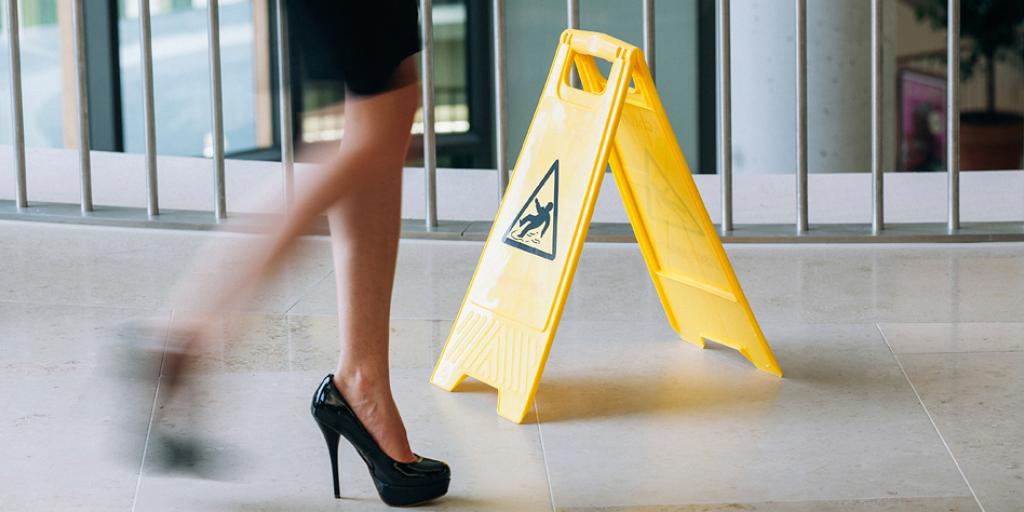
Are You Minding Your Steps?
To “mind your step” is an old English idiom that means to be careful when walking, and also to be careful about what we say, what we do and how we act, so as to avoid getting into trouble. Are you minding your steps?
Most of us have seen those bright yellow warning signs in public areas advising us to be careful walking on a freshly mopped floor, or around a swimming pool, or on a slippery, icy outdoor path or stairs. It is all too easy to slip and fall, possibly suffering serious injury, and such accidents are actually among the most common, especially in offices or other cluttered, high traffic work environments—while a deadly or debilitating fall can be the bane of the elderly, anywhere.
We all must be careful to avoid accidently stepping on something sharp, or twisting our ankle or bumping into a piece of furniture in the dark. The humorists tell us that the little toe is a device for finding furniture in the dark—but it is not so funny when it actually happens, and can be very painful. Gravity is indeed with us every minute of our lives—and so too is the danger of other “falls.”
Many of us as young children were admonished by our parents or teachers to “mind our step” or “mind our manners” or “mind our p’s and q’s,” or similar expressions. These admonitions were warning us to be careful how we acted to ensure proper behavior.
In the book of wisdom we read: “The simple believes every word, but the prudent considers well his steps” (Proverbs 14:15). That is very good advice. People are taken in by smooth-talking con artists every day, offering deals too good to be true. It is wise to consider carefully what we are being told and to find out if it is the truth before we take a misstep.
Accidents do happen, of course, and we all can misstep. We cannot see around corners or in the dark. And in spite of our best efforts we can still misstep, stumble and fall. Warning signs are helpful, but we can also benefit by following a map and even having someone who is a Guide help us avoid the pitfalls.
Another proverb explains: “The law of his God is in his heart; none of his steps shall slide” (Psalm 37:31). The law of God is a map, which explains where the safe path is and where to not to walk to avoid pitfalls.
Sometimes we need a Guide. “A man’s heart plans his way, but the Lord directs his steps” we are told in Proverbs 16:9. Proverbs 37:23 explains: “The steps of a good man are ordered by the Lord, and He delights in his way.” Who is better to guide us than the Creator who knows and sees all?
We can observe those who are not watching their steps yet seem to be prospering while doing evil. Psalm 73 describes the individual who says, “But as for me, my feet had almost stumbled; my steps had nearly slipped” (v. 2) as he became envious of the wicked. He saw them amassing “more than heart could wish” (v. 7), even though they were full of pride, speaking wickedly (v. 8) and being thoroughly ungodly (v. 12). The writer struggles to understand how the wicked can prosper while he himself had struggled to do what is right but seemingly had painfully “cleansed my heart in vain” (v. 13). But when he seeks God, then he “understood their end” (v. 17), that they are in slippery places (v. 18) and will be brought to desolation in a moment (v. 19). He acknowledges that God holds him by his right hand and guides him with His counsel (vv. 23–24). Minding our steps will ultimately win out.
Even if we find that we have fallen into a pit, if we will diligently seek God, He will deliver us. “He also brought me up out of a horrible pit, out of the miry clay, and set my feet upon a rock, and established my steps” (Psalm 40:2).
For help in minding your steps, read the free booklets, The Ten Commandments and What is a True Christian?
Stay up to date with our Weekly Digest Email!
Tomorrow's World ComMentary Podcast
Subscribe to Tomorrow's World Commentary podcasts on iTunes and Google Play!



